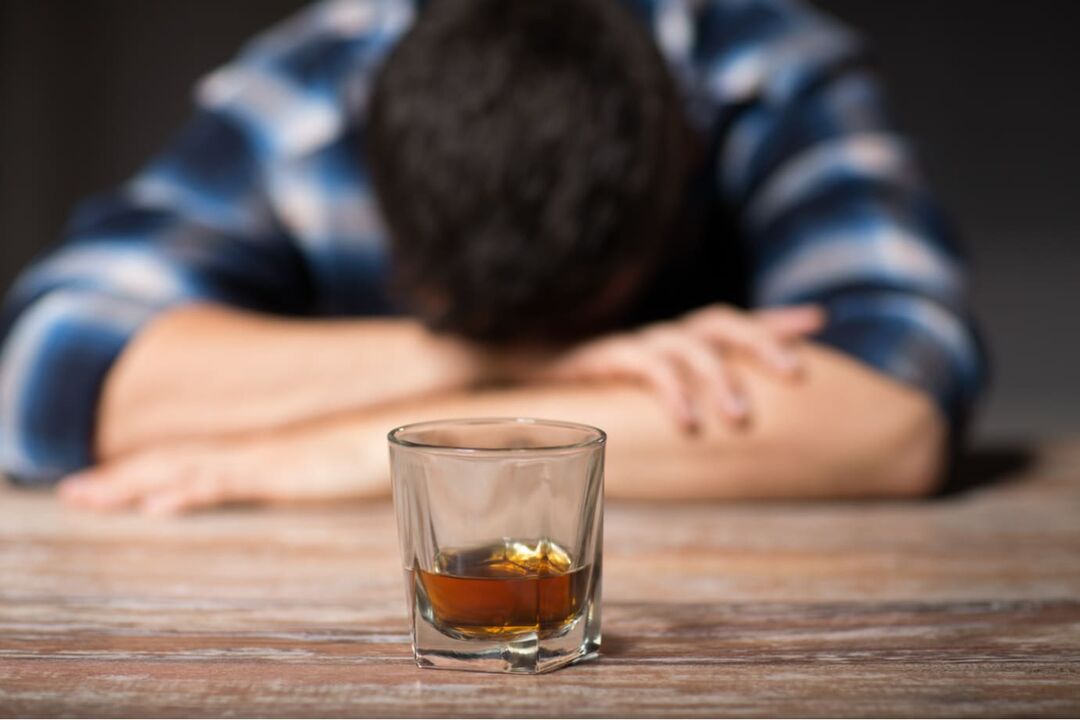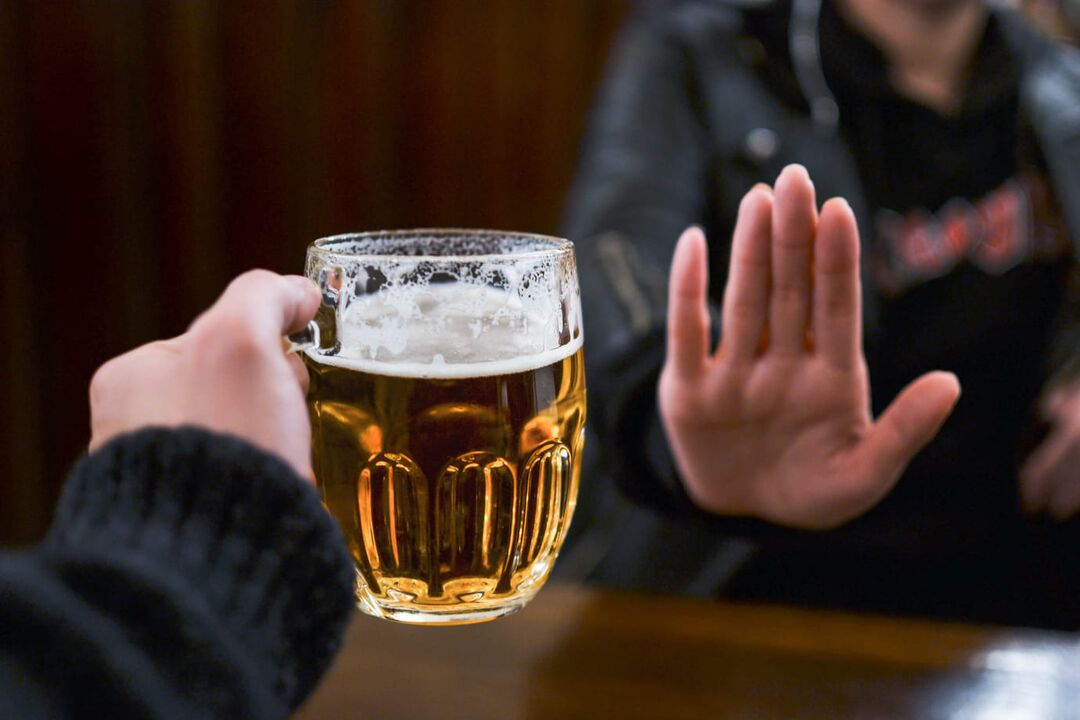Is it possible to suddenly stop drinking - of course, especially if you decide to give up alcohol on a daily basis. Yes, it will not be easy, but the "benefits" of a healthy lifestyle will be appreciated faster. Narcologists liken the gradual reduction in alcohol consumption to a partial tail loss. At some point, a person who drinks regularly may simply be left empty-handed. It is advisable to endure a temporary deterioration in well-being so as not to start again.
Abrupt abstinence from alcohol - an interesting reaction of the body
Alcoholism is both physically and psychologically dependent on ethyl alcohol. Therefore, when it suddenly enters the body, almost all vital systems react immediately. Not surprisingly, they now have to work in a modified mode. But do not pay attention to the temporary deterioration of your health, because the "friendship" with ethanol is expensive for the body. Expected results of abstinence from alcohol in the first few days:
- weight loss due to loss of appetite;
- insomnia and then drowsiness;
- dull migraine-type headaches;
- psychoemotional instability - nervousness, unexplained anxiety, apathy;
- mild migraine joint pain, trembling fingers.
It sounds scary, but these withdrawal symptoms are more common in older alcoholics. If a person uses a little, but every day, the physical condition practically does not deteriorate. Without an ordinary glass of beer, a glass of wine or 50-100 grams of vodka, there is only psychological distress.
What are the reasons for such a violent reaction of the body to the refusal to drink hard? The fact is that ethanol is involved in biochemical reactions by becoming an equal participant. When you try to get out of there, a temporary failure occurs in the body. You will now need to establish nerve regulation, begin producing the optimal amount of digestive enzymes, and repair damaged liver and urinary organs. Cope with these tasks for about 1-1, 5 months.

Typical symptoms of alcohol withdrawal
How to give up alcohol forever - full mobilization of willpower is required only with systematic domestic intoxication. In such cases, a person drinks a lot, often experiencing all the "flavors" of a constant hangover. After that, during the next binge, he has a problem with his psyche, heart and liver, and decides to "get out". What awaits alcoholics:
- 1 day. Symptoms of withdrawal immediately manifest themselves with nausea and vomiting, headache, severe tremors and, of course, an unbearable desire to hang. In fact, the first day of sobriety becomes a test of the strength of alcohol. If you can tolerate alcohol, your chances of overcoming addiction increase rapidly;
- 2-7 days. During this period, the alcoholic feels bad - the body demands a normal amount of alcohol, punishing the "owner" with headaches, visual and auditory hallucinations, tremors in the arms and legs. Digestion and peristalsis are disturbed, and the prospects for a healthy lifestyle do not look so bright for an alcoholic. Don't give up at this stage; medications and sleep will help you go to the end;
- 8th day. To make things a little easier, the improvements are noticeable to the naked eye. The severity of withdrawal syndrome is reduced, the body adapts well to the changed conditions of existence. He is now engaged in the regeneration of organs and tissues, learning to work fully without ethanol. Headaches, nausea, and irritability are reversed because ethyl alcohol and its toxic metabolites no longer circulate in the blood;
- 30-40 days. All this - now a person can give advice on how to give up alcohol. The body becomes lighter, physical and mental performance improves, and seemingly lost professional skills return. All vital systems work perfectly, the body works like clockwork. But don't worry - a sip of beer during this time can cause such an accident.
And now a small fly in the ointment. If a person drank too much and too often, his internal organs were constantly exposed to ethanol. In a state of intoxication, the cells were destroyed without further recovery. Chronic diseases developed without the suspicion of alcohol. After all, all the alarming symptoms were drowned out by another part of alcohol. But outside of euphoria, it will be impossible not to see them. It's time for a full medical examination. Once diagnosed, the doctor will develop a competent therapeutic regimen and prescribe medication.
The sad consequences of a long alcohol experiment are fatty liver degeneration, hepatitis, nephrosis, atrophic gastritis, or high acidity. All pathologies are severe, but the prognosis is favorable, which can be completely cured. Thus, a sharp abstinence from alcohol sometimes prevents disability and even death. After all, when an alcoholic tries to "get out" by lowering the dose, dangerous diseases develop, develop and recur in the body.

We will help you in any way we can - advice to those who quickly decide to "shut down"
The decision to stop drinking is often made spontaneously when a person suddenly realizes that a stroke, heart attack or cirrhosis is around the corner. Therefore, there is no time to prepare for the impending alcohol withdrawal after alcohol. Unlike relatives, family members who can quickly find all the necessary information. A person should be helped to give up drinking, support, and replace the shoulder during a difficult life for him.
In the first two weeks, there is more than one accident, so it makes sense to seek professional medical help. With pharmacological support, the transition to a sober lifestyle will be easier. Parenteral saline solutions, B vitamins, sedatives and anticonvulsants, respiratory analeptics, antiarrhythmic drugs, nootropics will help. The consequences of medical intervention are obvious:
- heart activity and respiration are normalized;
- sleep and appetite will be restored;
- nausea and vomiting will stop after the next meal.
How to stop drinking suddenly - just by combining willpower, medication and psychological support. The latter is very important, because the condition of the central nervous system changes dramatically. While adapting to work without ethanol, the addict suffers from hallucinations. He discusses with imaginary interlocutors, takes a few hours off and even sings. It is not worth paying attention to this - the psyche will be restored after the release of harmful substances from the body.
Proper rehabilitation - learning to live again
How to completely give up alcohol is a burning question. Narcologists note that a person's desire to stop drinking significantly increases the likelihood of long-term remission. Therefore, when making an important decision to give up alcohol, you should understand that everything that already contains ethanol is strictly prohibited.
It is difficult to get rid of alcohol forever without preparation. Overcoming the most difficult first days of withdrawal symptoms, you should look for additional sources to reduce your physical and psychological condition:
- Eliminate fatty and fried foods, salty foods and spices from your regular diet.
- Walk in the fresh air at least 1-2 times a day.
- They will return to their old hobbies, those who are interested in borderless drunkenness.
The transition to a sober lifestyle is gradual. A person is often disappointed and sees the future only in black. And then he gathers himself, convinces not to give up, and again participates in solving family problems. Narcologists recommend physical activity to speed recovery. No need to go straight to the gym or run long distances. An excellent way to recover quickly is gentle physical therapy.































